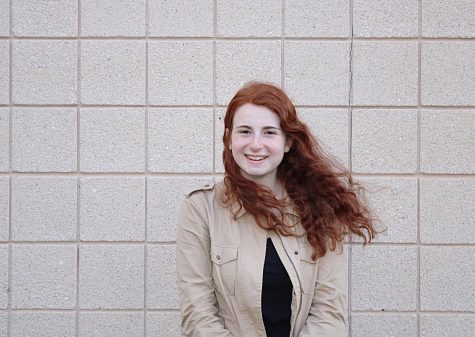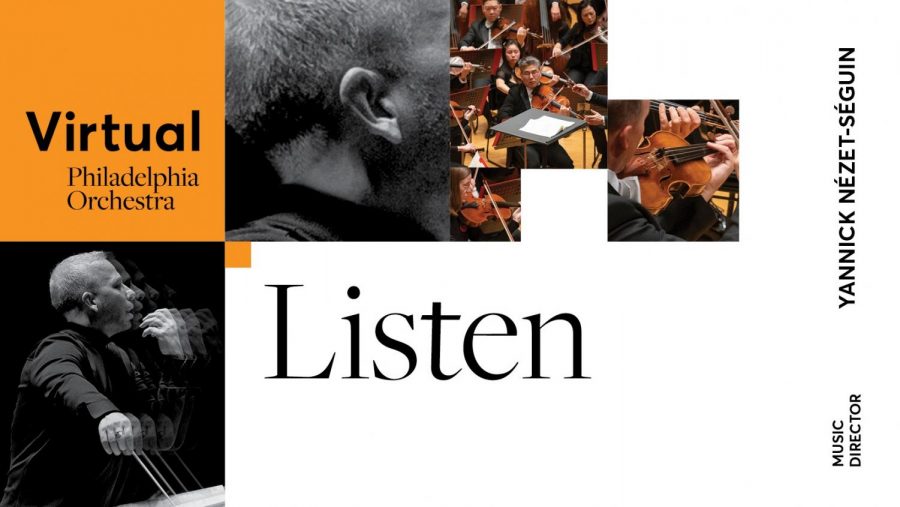The Philadelphia Orchestra’s Digital Stage
Exclusive Interviews From Philadelphia Orchestra Musicians and The CEO
Source: The official Philadelphia Orchestra website. For more information, visit philorch.org.
It’s seven o’clock on September 30th, and music-lovers all around the world are perched on the edge of their seats, watching their screens with anticipation. Suddenly, the audience is flying over the Mann Music Center, an outdoor venue right outside of the city. On the stage, in front of an empty amphitheater, is the Philadelphia Orchestra. The musicians are all in concert dress, accessorized by “Philadelphia Orchestra” masks.
This is Opening Night, the start of the 2020-2021 Season, which has been reimagined as the “Digital Stage.” Tonight, 146 days after their last performance together, the Orchestra is reunited; this time, however, the musicians sit six feet apart, woodwinds and brass shielded by plexiglass, playing together in a historic performance.
To learn about the Philadelphia Orchestra’s opening event and how the organization plans to move forward in the pandemic, I interviewed some of the Orchestra’s most prominent members: Concertmaster (First Chair Violin) David Kim, piccolo player Erica Peel, assistant Principal Cello Yumi Kendall, and the President and CEO of the orchestra, Matiás Tarnopolsky.
Q: Are you back to work in person?
Mr. Kim: Yes, but not in the manner I have done for decades- with a live audience in the concert hall. The Philadelphia Orchestra (PO) has been creating an entire fall season with video recordings of performances, all done outdoors, masked, onstage at The Mann Center for the Performing Arts in Fairmount Park.
Ms. Kendall: While we aren’t playing live concerts for live audiences, we are recording for documentary-style releases. These productions are for the Orchestra’s Digital Stage, which is our virtual “stage” during the pandemic. Also, in this transition phase, the musicians on stage (playing for the recordings) represent less than half of the entire orchestra! It’s much smaller – a maximum of 45 people or so – than the number we usually play with onstage in a live concert (closer to 100 musicians in a pre-pandemic concert in the Kimmel Center, for instance). Both of these points are to follow safety protocols, to make sure our orchestra family – musicians, staff, patrons – remain healthy. We are also so eager to connect with our audiences, who we miss so much, so we are doing our best to balance safety measures with musical connection through our Digital Stage.
Mr. Tarnopolsky: Not yet, we are all working remotely from home and spending countless hours on Zoom. Happily, we were able to go to work at the Mann Center for the Performing Arts when the Orchestra was able to reconvene and play together again.
Q: Were you nervous to return with the COVID-19 health risks?
Mr. Kim: Not one iota. The PO admin team has taken extraordinary measures to ensure everyone feels safe and comfortable. Those measures include testing at UPenn, having the musicians masked at all times, reducing the number of players onstage, and shortening the length of rehearsals, to name a few.
Ms. Peel: Very nervous! We’ve gotten used to a “being around people is dangerous!” mentality, so it’s an adjustment to trust the safety protocols.
Ms. Kendall: I was personally not nervous to return. I serve on a musician committee that works in-depth with our staff and managers who are working tirelessly to ensure everyone’s safety, so I saw firsthand how much effort went into protecting everyone involved in the performances and events. So I was eager to return! Importantly, I also have the benefit, as a cellist, of being able to wear a mask when I play, unlike wind and brass players for whom other safety measures were in place instead of masks (winds and brass musicians had more distance between players, and were surrounded by plexiglass shields). Theirs are a different set of safety questions, and our managers, staff, and musician colleagues worked closely together- and continue to do so – to ensure safety and artistic quality as much as possible.
Mr. Tarnopolsky: Yes, we were nervous, but, at the same time, we took very seriously all the many layers of precautions we put in place to ensure everyone was safe.
Q: What did you miss the most about the Philadelphia Orchestra environment pre-COVID?
Mr. Kim: Having guests back to my dressing room after the concert for a Champagne toast and chocolates!
Ms. Peel: Playing music alone just isn’t the same! What we do as an orchestra is based on non-verbal communication, reading each other and reacting in real-time. I missed the connection that performing music live provides, and I missed those “goosebump” moments that happen when everything clicks.
Ms. Kendall: I miss people, in-person people! I miss hugging my friends! I miss sharing food, and most of all, from the musical perspective, I miss being close to other musicians to sense our non-verbal communication. This means things like sensing energy, musical flow, expression, and nuances that we’ve worked so hard to cultivate over our individual training years as well as, distinctively, together in the Philadelphia Orchestra.
Mr. Tarnopolsky: I miss hearing the Orchestra performing and rehearsing. The big perk of my job is being able to hear the Philadelphia Orchestra on an almost daily basis. I really miss also being with my colleagues in the office – it’s just not the same via Zoom.
Q: Did you find Opening Night to be a special experience even without an audience?
Mr. Kim: Yes. I could feel the urgency and care from both sides of the screen: audience and performers. We might not have been together in person, but we all felt no less love for the PO and everything it represents.
Ms. Peel: Absolutely! We rarely get to watch our own concerts, so it was a special occasion for us musicians in many ways. After so much time away from one another, Opening Night was a symbol of hope and unity. It was very emotional!
Ms. Kendall: Preparing for and performing (recording for) Opening Night was a thrill because it’s a celebration. It was indeed very different this year, though, and we are so grateful to our forward-thinking planning committee who made it happen! The absence of an in-person audience makes me appreciate the audience even more… and I can’t wait until we can all be together again, whenever it may be.
Mr. Tarnopolsky: Opening Night was a treat. The Volunteers did a wonderful job creating the Opening Night experience virtually. We raised funds for the Orchestra, and everyone had a celebratory season opening.
Q: Did you practice more or less in quarantine?
Mr. Kim: Less. But much more efficient practice and strangely- much more satisfying.
Ms. Peel: I practiced differently. When we were working, practice revolved around the repertoire the orchestra was playing. Without that as a guide, I practiced more fundamentals and solo repertoire. Some days I practiced far more than usual, and other days I didn’t practice at all. Having balance and showing myself grace were keys during quarantine!
Ms. Kendall: I’m practicing less. It’s so difficult! Also, my husband and I recently moved, and I am expecting and due in about one week, so I’m rather tired from being pregnant! But in addition to the (happy!) logistics of my personal life, the stagnation of the pandemic has uprooted my sense of time, and the lack of structure has forced me to internally re-evaluate my own sense of time and structure, and impose my own structure and heightened discipline (e.g. cello practice). Sometimes it works, sometimes it doesn’t… but I also have self-compassion, which I’m channeling a lot these days, and I also have perseverance so I’m determined to make it through this!
Q: How did you keep your spirits up when you were at home?
Mr. Kim: I have never had this much free time in my adult life… and I have been concertmaster for 21 years – a super pressure-filled position. I loved having free time each day to garden (successfully!), take long walks with our Cockapoo, Maisy, play a lot of golf (handicap lowered by 3 shots!), get lots of sleep, and actually lost a few lbs!
Ms. Peel: Staying connected to my friends, and being each other’s support system, kept my spirits lifted. We had weekly group virtual hangouts on Houseparty, and I was texting with friends constantly! I also enjoyed practicing yoga every day, which I hope to continue into “real life.” It had a wonderful way of centering my mind and giving me peace.
Ms. Kendall: I said yes to projects, to help the orchestra’s virtual presence and keep me motivated. I needed that to keep me in gear; I need things to work on that I care about deeply.
Fun Question: Did you stay in touch with any friends from the Orchestra during quarantine?
Mr. Kim: At first we did Zoom cocktails but that inevitably got old. I actually saw colleagues here and there for long walks together, socially distanced outdoor Happy Houses, and playing golf.
Ms. Peel: Yes! Our weekly Houseparty hangout was with friends in the orchestra. It was so nice to laugh until we cried and shared things just like we did in person before.
Ms. Kendall: Yes! Two of my orchestra friends and I held regular Zoom lunches for most of the spring and into the beginning of the summer. It was so important and rewarding to connect and simply catch up with each other. I think, if nothing else, this pandemic is showing us how much we are truly social creatures. We need social connections and shared experiences are much as we need food and water. We can get through this!
Mr. Tarnopolsky: Yes, constantly. It’s what is keeping us sane, connected, and optimistic in this difficult moment.
I wanted to ask Mr. Tarnopolsky a few different questions than the musicians. I was especially curious about some of the decisions which went into creating the Digital Stage, and if any of these ideas would remain to shape the Orchestra after COVID-19 is over.
Q: What have some of the challenges been so far, and what challenges do you think you might face in the future as the pandemic continues?
Mr. Tarnopolsky: Not being able to put on concerts is a monumental problem. The Digital Stage is wonderful, but it cannot replace the millions of dollars in ticket sales that we are not selling during the pandemic, or at any time soon.
Q: Do you think you will keep any ideas you’ve developed during COVID, after the pandemic is over?
Mr. Tarnopolsky: Absolutely. I love our new Digital Stage, for example, and think it could be a wonderful way to connect with audiences globally on a regular basis.
These musicians have reinforced an important aspect of this year’s pandemic; we should continue to do the things that we love in quarantine, even if we do them differently. Do a sport while social distancing from your teammates, or by yourself in your backyard. Practice new music, invest your time in new hobbies, and above all, stay connected.
Check out the Philadelphia Orchestra’s website (https://www.philorch.org/) to find when they will play their next concert on the Digital Stage!

Jenna, an IB senior, is so excited for her fourth and final year at The Harriton Banner, this year as Executive Editor. Along with writing articles, Jenna...


